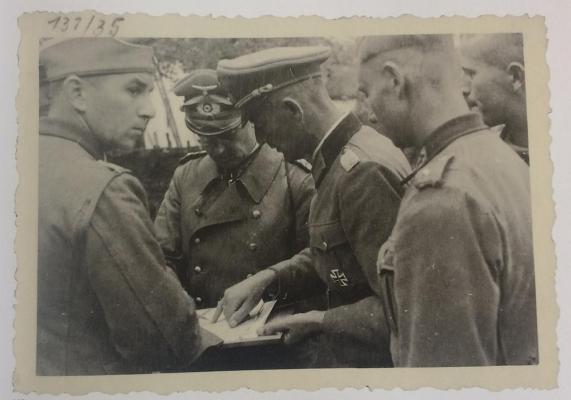All at War: Photography by German soldiers, 1939-1945
Τον Σεπτέμβριο 1939, χιλιάδες Γερμανοί στρατιώτες ξεχύθηκαν στην Πολωνία. Το 1940, εισέβαλλαν στην Ολλανδία το Βέλγιο και τη Γαλλία. Το 1941 μπήκαν στα Βαλκάνια και εν συνεχεία στη Σοβιετική Ένωση. Οπλισμένοι με φωτογραφικές μηχανές Leica και Rolleiflex, ορισμένοι από τους στρατιώτες αυτούς χρίσθηκαν επίσημοι φωτογράφοι, ενώ άλλοι κλήθηκαν από τους διοικητές τους να καταγράψουν τα γεγονότα. Μεταξύ των ήσαν νεοσύλλεκτοι που είχαν ακούσει για το Bauhaus, καθώς και άλλοι, μεγαλύτεροι σε ηλικία, που θυμούνταν τη Βαϊμάρη. Κάποιοι απ’ αυτούς ήσαν εξαιρετικοί πορτρετίστες, ενώ άλλοι παραμυθιάζανε, ήσαν στιλίστες ή ουμανιστές που δάκρυζαν με τα όσα έβλεπαν. Το στιλ και το περιεχόμενο της εργασίας τους άλλαξε μαζί με το συλλογικό αίσθημα μετά το 1942, αλλαγή που διακρίνεται στις ίδιες τις φωτογραφίες τους. Ο Ian Jeffrey μελέτησε τις φωτογραφίες αυτές, επιλέγοντας τις πιο αξιοσημείωτες και δημιουργώντας έτσι μια προσωπική καταγραφή ανωνύμων βίων που ζούνε πρωτόγνωρες στιγμές.
In September 1939, thousands of German soldiers were turned loose on Poland. In 1940, they descended on Holland, Belgium and France. In 1941 they went to the Balkans, and then to the USSR. Armed with Leica and Rolleiflex cameras, some of these soldiers were officially commissioned as photographers, while others were asked by their commanders to snap records of events. Among them were trainees who knew about the Bauhaus, and other, older, men who could remember Weimar. Some excelled at formal portraiture, others were storytellers, stylists or humanists who wept at what they saw. The style and content of their work changed along with the collective mood after 1942, a change that is discernible in the photographs themselves. Ian Jeffrey has trawled through these albums, picking out the most compelling of these works to create an intimate record of anonymous lives experiencing the unprecedented.
Ο Ian Jeffrey συμμετέχει στο Συνέδριο για την Ιστορία της Ελληνικής Φωτογραφίας με τη στήριξη του Goethe Zentrum Chania και του Goethe-Institut Athen.
Ian Jeffrey is participating in the conference thanks to the financial assistance of Goethe Zentrum Chania and Goethe-Institut Athen.

